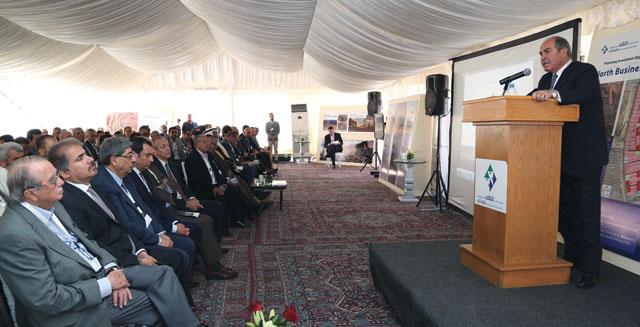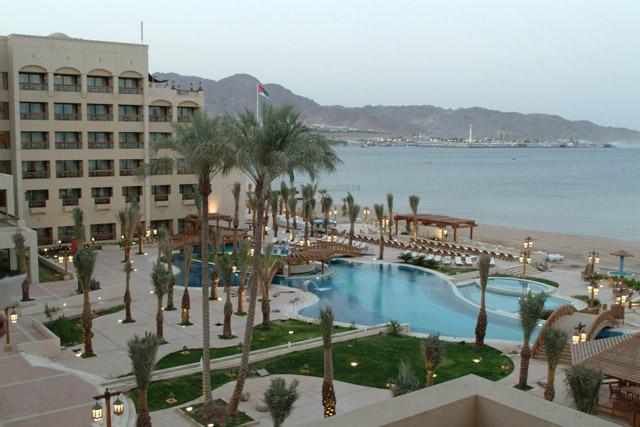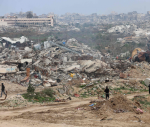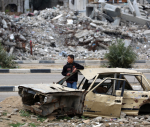You are here
Mulki paves way for more vibrant Aqaba with commercial, service opportunities
By Samir Ghawi - Apr 25,2015 - Last updated at Apr 25,2015

AQABA — Jordan’s port city is at a crucial juncture, the chief commissioner of Aqaba Special Economic Zone Authority (ASEZA) told a large gathering of businessmen on Thursday.
Hani Al Mulki said consecutive ASEZA administrations have elevated Aqaba to a level that positions it to truly become Jordan’s economic capital.
Yet, besides the strides achieved in terms of infrastructure, construction, transport, tourism and industrial development, the chief commissioner added that the cycle is incomplete without a wider business sector.
He pointed to tradesmen and providers of services as two categories that are still needed to give Aqaba a further commercial boost .
“Take the initiative now because that is where innovation starts and where profits await those who grab opportunity first,” he said. “Those who hesitate end up losers.”
Mulki added that Aqaba started with one port and now has nine, not only serving the Kingdom but many regional countries.
In 2001, Aqaba had 500 hotel rooms, most of which were below 4-star classification. In 2014, he indicated, the number of rooms reached 4,125 with an added quality from 4- and 5-star hotels that enhanced the status of the port city as a competitive tourism destination.
ASEZA's chief commissioner expects the total number of hotel rooms to reach 7,978 by the end 2017. Part of this increase will emerge from other value added mega projects that Ayla and Saraya 5-star hotels will provide.
Another substantial part will come from 3-and 4-star hotels to widen the diversification of Aqaba's tourism offerings and cater to market demands.
He mentioned King Hussein Airport, Saraya Aqaba, Tala Bay, Ayla and Mersa Zayed as major contributors to the city’s development, and commended Arab Bank for opening a significant foothold in the port city.
“We need more banks, insurance companies, lawyers, accountants, moneychangers and other service providers,” he stressed, offering investors and businessmen the North Business District as new ground for commercial development.
Covering 704,000 square metres in total area that is fully serviced with state-of-the-art infrastructure, the parcels range between 4,000 metres and 10,000 metres that can be used for investments such as shops, offices, dormitories, restaurants, coffee shops, gyms and health club centres, banks, meeting halls, hotels, furnished apartments, student housing, and recreational and sports centres.
The chief commissioner spoke of sport tourism as another potential business of attraction emphasising the importance of widening appeals in order to give Aqaba an added advantage over regional competitors and make it more vibrant.
Speaking in a large elegant tent erected at the site, Mulki indicated that about 1,500 condominiums will be on sale in the coming few months and, with the flow of high-income families, there will be a need for a wide range of professionals in various trades to cater for the rising of affluent population in Aqaba.
Mulki detailed the progress and development activities in Aqaba listing Tala Bay as an existing scheme that comprises 450 housing units.
Under construction are: Ayla (450 housing units); Saraya (750); Mersa Zayed or Al Raha Village (512); and Aqaba National Real Estate projects Company (170 units close to the North Business District for middle class families).
In total, nearly 2,340 housing units are in the pipeline until 2017.
Another 170 housing units will be constructed also near the zone in 2017.
All these newcomers will need banking, insurance, and logistic services, he said, adding that he will soon be holding meetings with members of the business community, including the chambers of industry and commerce as well as various associations, to discuss how best can they support this investment drive.
He asked the businessmen attending the gathering to prop up investments and spread the word to relatives, friends and associates reiterating repeatedly that Aqaba stands at a juncture for an economic boom by 2017.
Mulqi admitted that the road will not be rosy but affirmed the determination to press ahead despite all impediments because Aqaba cannot wait at a time when regional competitors are advancing investment schemes in all areas.
According to the bulletin highlighting the North Business District, deals with investors will be conducted as land development and ownership transfer.
“First instalment is due upon signing the land development and transfer agreement,” the bulletin indicated. “Second instalment is due 12 months from the date of signing the accord.”
Third and final instalment is due 24 months from the date of signing the agreement.
“Land ownership transfer to second party is subject to settling all due payments in addition to developing 40 per cent of the project,” the bulletin said in an apparent control step to prevent real estate trading.
“The progress of the project will be estimated by comparing the actual cost of the completed development of the project with the estimated total development cost of the entire project as per the maximum allowed built up area as per the general scheme/master plan included in the agreement,” it added.
Because the district is strategically located in the northern part of Aqaba with proximity to the city centre, King Hussein International Airport, the Dead Sea road and the desert highway connecting Aqaba to Amman, the land adjacent to main roads costs JD120 per square metre whereas interior land costs JD100 per square metre.
“The district is surrounded by Aqaba’s central health, educational academies, residential and commercial projects such as ASEZA building, Arab Bank, University of Jordan-Aqaba branch, Prince Hashem Bin Abdullah Hospital, and Raya Plaza,” the bulletin indicated.
Related Articles
The Aqaba Special Economic Zone Authority (ASEZA) and its investment arm, Aqaba Development Corporation (ADC), are working on an ambitious plan to diversify the tourism product to attract and “retain” foreign and local tourists and create more opportunities for the zone’s residents.
AMMAN — At a Cabinet meeting on Wednesday, Aqaba Special Economic Zone Authority (ASEZA) Chief Commissioner Hani Mulki reviewed the work pro
AMMAN — The Aqaba Special Economic Zone Authority (ASEZA) will award the Hyatt Regency Aqaba Ayla Resort a five-star deluxe classification t

















